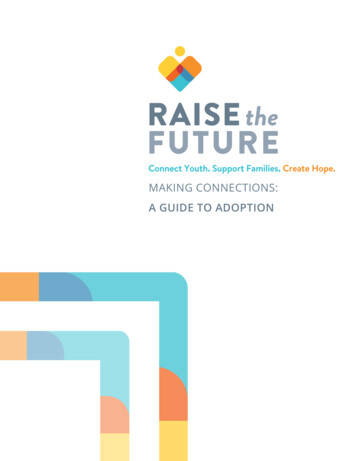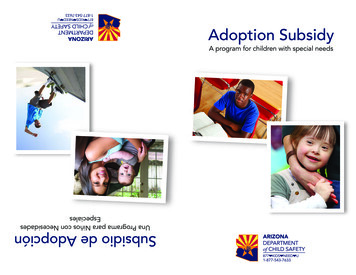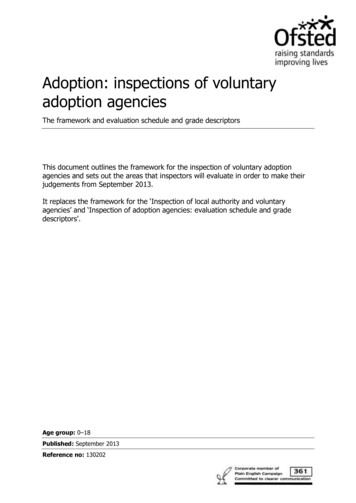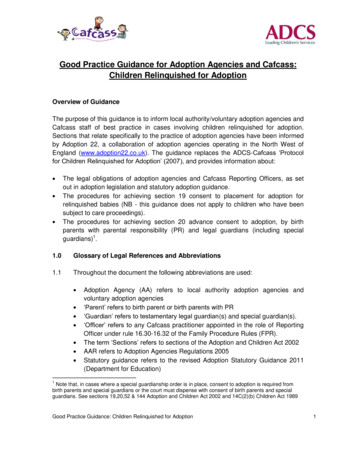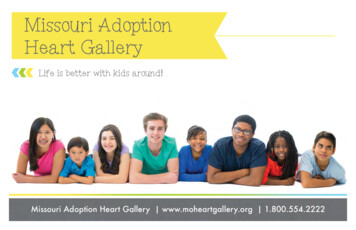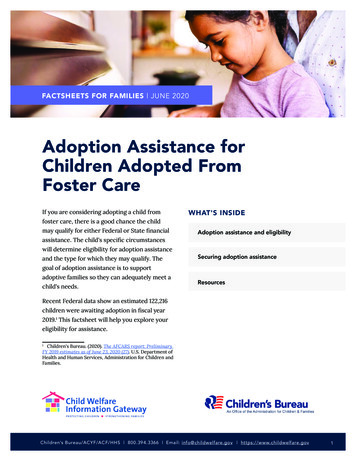
Transcription
FACTSHEETS FOR FAMILIES JUNE 2020Adoption Assistance forChildren Adopted FromFoster CareIf you are considering adopting a child fromfoster care, there is a good chance the childmay qualify for either Federal or State financialassistance. The child's specific circumstanceswill determine eligibility for adoption assistanceand the type for which they may qualify. TheWHAT'S INSIDEAdoption assistance and eligibilitySecuring adoption assistancegoal of adoption assistance is to supportadoptive families so they can adequately meet achild's needs.ResourcesRecent Federal data show an estimated 122,216children were awaiting adoption in fiscal year2019.1 This factsheet will help you explore youreligibility for assistance.Children's Bureau. (2020). The AFCARS report: PreliminaryFY 2019 estimates as of June 23, 2020 (27). U.S. Department ofHealth and Human Services, Administration for Children andFamilies.1Children’s Bureau/ACYF/ACF/HHS 800.394.3366 Email: info@childwelfare.gov https://www.childwelfare.gov1
ADOPTION ASSISTANCE ANDELIGIBILITYThe Federal Adoption Assistance and ChildWelfare Act of 1980 established a programof financial and medical assistance tohelp promote adoptions from foster care,reduce financial barriers to adoption, andhelp adoptive families meet their adoptedchildren's needs. This adoption assistanceis also called a subsidy and is availablefor children who meet certain eligibilityrequirements, including that the child isdeemed as having special needs due totheir physical, mental, or developmentaldisabilities or because there are otherfactors that may make it harder to find anadoptive family. Some children in foster caremay have conditions that are the result oftheir early infant or childhood experiences.This may include physical or mental healthdisorders, learning difficulties, or relateddevelopmental delays that require ongoingtreatment or specialized medical, therapeutic,A child who is eligible for Federal adoptionassistance is entitled to receive both anadoption assistance subsidy and medicalassistance (such as Medicaid) if the child isadopted by a family that the State deemsappropriate for that child. If the child iseligible, you are entitled to receive ongoingmonthly payments while the child is in yourcare and you are responsible for the child.The assistance may last until the child reachesthe age of majority, which in most States isage 18—although some States provide Federaladoption assistance up to age 21. Adoptionassistance may also include a one-timepayment to help you cover at least a portionof your adoption expenses. Depending on theState and the child’s circumstances, assistancemay include other support services, such aschild or respite care, or services that addressthe child’s specific developmental needs.These services must be listed and included inthe adoption assistance agreement to ensurethat they are provided to the child.3or educational attention. Special needs don’tnecessarily have to be medical or physical.Many States provide adoption assistance tochildren of color, children who are older, orthose who are being adopted with brothersand sisters. Each State can determine whatfactors or conditions a child must have inorder to be considered to have special needsfor purposes of establishing eligibility foradoption assistance.2Children's Bureau. (2019). I want to adopt a child from foster care. Am I eligible for adoption assistance (also called adoptionsubsidy)? U.S. Department of Health and Human Services, Administration for Children and Families.3Children's Bureau. (2018). Child Welfare Policy Manual, 8.2A, Title IV-E Adoption Assistance Program, Agreements.2Children’s Bureau/ACYF/ACF/HHS 800.394.3366 Email: info@childwelfare.gov https://www.childwelfare.gov2
Among other critical eligibility criteria,Adoption Tax Creditsin order to qualify for a Federal adoptionsubsidy, the child you are adopting must beIn addition to the Federal and Stateeligible for adoption assistance under titleadoption assistance programs, familiesIV-E of the Social Security Act by meeting thewho adopt children from foster carefollowing criteria for having special needs:4are eligible for a tax credit. Tax benefitsinclude a tax credit for qualified adoptionexpenses and an exclusion from incomefor employer-provided adoptionassistance. The tax credit is based on afamily’s income and tax situation. Whilethe tax credit is limited to the year inwhich the adoption is finalized, creditexceeding a family’s tax liability can be The State has determined the child cannotor should not be returned to the parents'home. The State has identified a specific factor orcondition, or a combination of factors, thatmake it reasonable to conclude that thechild cannot be placed with the adoptiveparents without adoption assistance andcarried forward for up to 5 years.Medicaid; or the child meets the medicalFor more information, see the IRS page onSupplemental Security Income (SSI).Adoption Credit and Adoption Assistance The State has made a reasonable butPrograms.or disability eligibility criteria for Federalunsuccessful effort to place the childwithout Federal adoption assistance andTYPES OF ADOPTION ASSISTANCEMedicaid (unless this is against the child’sbest interests). If an adoptive parentChildren may qualify for Federal or Stateinforms the State that they are not ableadoption assistance. Some States provideto adopt the child without assistance, thisadoption assistance for children who do notprong of the special needs test will be metqualify for Federal assistance. In most cases,as to the child's eligibility.the benefits are the same whether the subsidyis Federal or State, but there are occasionallysome differences related to receivingMedicaid. For example, some States do notprovide Medicaid for children who are onlyeligible for State-funded adoption assistanceunless there is a disability that warrants;however, all children who are eligible forFederal adoption assistance are categoricallyeligible for Title XIX Medicaid or an equivalenttype of health coverage .For more information on how you may qualifyfor Federal title IV-E assistance, see the ChildWelfare Policy Manual's Section 8.2B, TitleIV-E, Adoption Assistance Program Eligibilityand the Children's Bureau InformationMemorandum on Title IV-E AdoptionAssistance 'Applicable Child Eligibility Criteria.If your child does not qualify for Federalassistance, they might be eligible for Statefunded adoption assistance. Child WelfareTitle IV-E Adoption Assistance 'Applicable Child' Eligibility Criteria; section 473 of the Social Security Act; Child WelfarePolicy Manual, §8.2B.4Children’s Bureau/ACYF/ACF/HHS 800.394.3366 Email: info@childwelfare.gov https://www.childwelfare.gov3
Information Gateway maintains a State-by-The Children's Bureau offers a webpageState adoption assistance database that seekson adoption assistance. Child Welfareto answer questions about State policiesInformation Gateway also hosts a webpage onon adoption assistance and postadoptionadoption assistance that may be helpful as youservices, including the following:explore eligibility for assistance. What is your State's definition of "specialSECURING ADOPTIONASSISTANCEneeds?" What are the eligibility criteria for yourState-funded adoption assistance program? What is the maximum amount a family canWhen a child is in the placement and careresponsibility (custody) of a State fostercare agency, that State is responsible forreceive in one-time, nonrecurring adoptiondetermining and entering into the adoptionexpenses from your State?assistance agreement with prospective When can the adoption assistancepayments and benefits begin in your State? Does your State enter into deferredadoption assistance agreements? What mental health services are providedby your State? Does your State provide additional financesparents regardless of where they live. If theadoption is approved, the agency will drawup an adoption assistance agreement for theprospective adoptive parents to sign. As theprospective parent, you can negotiate theterms of the financial assistance, which mustnot exceed the amount that the child wouldhave received while in foster care. You alsofor medical or therapeutic needs notshould discuss and negotiate services thatcovered under the State medical plan foryou believe the child needs or will need inchildren receiving adoption assistance?the future. Each State has its own procedure What is your State's process for applying fora fair hearing?A fair hearing is a legal, administrativeprocedure that provides a forum forsettling certain types of disputes betweenapplicants for Federal adoption assistanceor recipients and the public agency thatadministers the program. If you think adecision is unfair, you may be able torequest a fair hearing to resolve the dispute.See Information Gateway’s database forState-specific policies on fair hearings.for initiating and completing the adoptionassistance agreement, including how themonthly payment amount is negotiated.The adoption assistance agreement must befinalized, signed, and in effect at the timeof, or prior to, finalizing an adoption. Withrare exceptions, it is highly unusual to obtainan adoption subsidy after an adoption hasbeen finalized if the adoption assistanceagreement was not in effect at the time thatthe adoption was finalized. Federal law allowsfor the terms of the assistance agreementto be renegotiated if the circumstancesof the adoptive family and needs of theChildren’s Bureau/ACYF/ACF/HHS 800.394.3366 Email: info@childwelfare.gov https://www.childwelfare.gov4
child change over time. In the event that aFor State-specific information, see Does Yourmedical, developmental, or mental healthState Enter Into Deferred Adoption Assistanceneed surfaces after an adoption is finalized,Agreements? on Information Gateway'sadoptive parents can seek to renegotiate theState-specific adoption assistance database.terms of the adoption assistance agreementwith the State to address the child's needs.agreement unless the parents concur withWhen Adopting a Child From Outof-State or Moving to AnotherStatesuch a change. Consult Information Gateway'sIf you are adopting a child fromFor the most part, once the agreement isfinalized, the agency cannot change theadoption assistance database for moreinformation.another State, and the State agencyhas responsibility for placement andDEFERRED ASSISTANCEcare (custody) of a child, that State isDepending on the State placing the child, theassistance agreement and paying the titleState may want to negotiate with the parentsIV-E adoption subsidy. This applies evento defer adoption assistance/financialif the child is placed in an adoptive homesupport until it is needed to meet a child'sin another State. If, however, the Stateneeds or until the child’s disabilities areagency does not have responsibility fordiagnosed. This is most often used whenthe child’s placement and care (custody),families are adopting a young child withthe adoptive parents’ State of residence ispotentially high risks for developing a medicalresponsible for determining whether theor psychological condition. In these cases, thechild is eligible for adoption assistance;State may provide Medicaid andentering into the adoption assistancereimbursement of nonrecurring adoptionagreement; and paying the subsidy,expenses, without providing a monthlyconsistent with the way public benefits arepayment. Your adoption assistance agreementpaid in other programs. Children retainmay specify the events or conditions thattheir eligibility for adoption assistance andwould initiate the need for services or activateMedicaid across State lines; however, thethe monthly payment option. An adoptivedetails of the child’s Medicaid service areparent also may decline a financial subsidylikely to change if your family relocates tothat the State offers. Psychiatric reports andanother State after adopting. For moreother documentation are often required toinformation, see Information Gateway’sjustify the need for a subsidy. In some States,webpages on Adopting Childrenparents can choose to defer financialFrom Other States or Jurisdictions andassistance until needed for specific services.Interjurisdictional Placements.responsible for entering into the adoptionChildren’s Bureau/ACYF/ACF/HHS 800.394.3366 Email: info@childwelfare.gov https://www.childwelfare.gov5
APPEALING AN ADOPTION ASSISTANCEDECISION Child Welfare Policy Manual: Title IV-E Adoption Assistance & Financial Support,In general, you can use your State's faira webpage on Raise the Future (formerlyhearing and appeals process if you dothe Adoption Exchange), a nonprofit childnot agree with the decision on adoptionwelfare organization created to promoteassistance. The agency that enters into thesafety and permanence for children inadoption assistance agreement is required tofoster careinform you about the appeals process. Somefamilies choose to work with an attorneyor seek help from an advocacy organizationrepresenting children with special needsduring this process. For more informationon the fair hearings process, see What IsYour State's Process for Applying for a FairHearing? on Information Gateway's State- National Foster Care and AdoptionAssistance Directory, an InformationGateway database State Adoption Assistance Specialists, anInformation Gateway webpage Title IV-E Adoption Assistance, a Children'sBureau webpagespecific adoption assistance database.SUGGESTED CITATION:RESOURCESChild Welfare Information Gateway. (2020).Below are some additional resources forAdoption assistance for children adopted fromprospective adoptive parents:foster care. Washington, DC: U.S. Department Adoption-Friendly Workplace, a webpage offor Children and Families, Children’s Bureau.the Dave Thomas Foundation for Adoption,of Health and Human Services, Administrationwhich lists the top 100 companies foremployer-provided adoption benefits andcompares financial reimbursement and paidleave policies Benefits.gov, the official benefits website ofthe United States GovernmentU.S. Department of Health and HumanServices Administration for Children andFamilies Administration on Children,Youth and Families Children’s BureauThis material may be freely reproduced and distributed. However, when doing so, please credit Child Welfare InformationGateway. This publication is available online at en’s Bureau/ACYF/ACF/HHS 800.394.3366 Email: info@childwelfare.gov https://www.childwelfare.gov6
1 FACTSHEETS FOR FAMILIES JUNE 2020. Children's Bureau/ACYF/ACF/HHS 800.394.3366 Email: info@childwelfare.gov https://www.childwelfare.gov Adoption .

